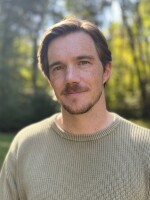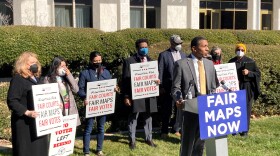Ron Stacker Thompson knew from a young age that he wanted to be a teacher. He grew up in Chicago, excelled in school, and loved his time in the classroom. He attended Illinois State University and went on to try his hand at teaching. But his work as a drama teacher quickly led to another career on stage.
Thompson first started acting as a way to improve his skills as an educator, but he started to land significant roles and eventually became the first African-American cast as Jesus in the national touring company for the hit musical “Godspell.” With the help of his students at Merritt College, Thompson also founded the Oakland Ensemble Theatre, a company that specializes in multiracial casting. Thompson eventually moved to Hollywood where he spent years as a producer and screenwriter.
He worked on movies like “Sister Act 2: Back in the Habit” and “America’s Dream.” In the late ‘90s, Thompson moved to North Carolina to become a professor at the UNC School of the Arts in Winston-Salem. Today he is chair of the screenwriting discipline at the school.
Host Frank Stasio talks with Thompson about his upbringing and his career in theater and film.
Interview Highlights:
On Thompson’s upbringing in Chicago and the eclectic neighborhood he grew up in:
My neighborhood was the most special neighborhood you could imagine. It had everything. It had African-Americans, and they were called “bohemians” at the time. We’re talking about the late ‘40s into the ‘50s, but they were European whites. And there were Latin people there. This amazing neighborhood, and I didn’t know it was amazing until I grew up and realized that most people came from one kind of neighborhood. There was one kind of economic thing going on, like the neighborhood was all black or all white or all Latina.On quitting his job as an English teacher in Chicago and moving to California: I was maybe 22 or 23, and I said, “I will not stay here in a place that doesn't allow me to be all I can be and do all I can do for the students.” So I quit and had a friend in San Francisco who said, “Why don’t you come out here at least for the summer until you decide what you’re going to do?” So I went, and all of a sudden I realized that was a fool-hearted thing to do. You now have no job, and you don’t know this area really, so what’s going to happen? He said, “I am going to a pool party in Orinda” … And he invited me to come, and I said, “No, I need to find a job. I need to concentrate here. I do not need to go and lie around a pool especially when I don’t even swim.” But he was persistent, so I went. And there as I am semi-brooding I hear someone say, “You know, I have to stop having all this fun. I’ve got to find an English teacher.” And I raised my hand and said, “I’m an English teacher!” And he says, “Can you be in my office Monday morning?” I said, “I will be there.” This is Oakland Technical High School, and I had the credits and the experience, so he hired me to teach English. As I was about to leave the office gleefully when he said, “Wait a minute, I forgot you also have to teach drama. You do teach drama, right?” And I went, “Of course!” I had no experience. I had never acted, never thought about acting, but I had the summer to learn, so I took classes. At that time in San Francisco they would have in the paper auditions for professional shows, so I said to myself, “Do it. Try it.” I began to get this feedback that I had some talent and began to land roles.
On seeing the musical “Godspell” in New York City and then auditioning for the production when it came to San Francisco: One of the shows that we saw one of those times was “Godspell.” It was off Broadway, and we both loved it. We just loved it. And we went back to California and lo and behold there were auditions coming up for “Godspell.” And again many hundreds of people from all over the country came to audition because it was that kind of show that attracted people. You just wanted to be in it … [My wife and I] were both lucky enough to be cast in the show… And we didn’t know at the time we were all cast who was going to be what person. And when the director cast me … As Jesus there was this gasp, and I was stunned. I had no idea because in the New York company there was one black man, and he sang the song that I loved, and I thought, “I am going to be cast as him.” That is generally what happens, but no I was cast as Jesus. And this became such a thing. When the show opened we were picketed by Jews for Jesus — that was the name of the group. We of course got incredible reviews … And the picketing only added to folks coming. They had to come and see what was going on.
On his decision to go from the theater to Hollywood as a film producer and screenwriter: I just decided I wanted to find out what film was about. Not that I wanted to do away with theater, but what is film about? I thought I wanted to be, or try to be, a director for film. I had this great friend. She was the executive secretary to Bill Duke, the director and actor. She said, “Ron, if you’re really interested in film, why don’t you come and meet Bill?” He’s a director at the time for like night soaps, but he wanted to go into film. So I flew and met him, and we hit it off. He said to me, “When I get a film, I’m going to call you.” Now everybody says that, but he actually did call. I went out, my wife stayed in New York, and I went out there and began to work with him and shadow him and learn about film. Other than teaching English, everything I’ve learned was on the job.
This program originally aired on November 6, 2017.








